Abstract
Previous studies have demonstrated familial clustering of prostate cancer. To define the nature of this familial aggregation and to assess whether Mendelian inheritance can explain prostate cancer clustering, proportional hazards and segregation analyses were performed on 691 families ascertained through a single prostate cancer proband. The proportional hazards analyses revealed that two factors, early age at onset of disease in the proband and multiple affected family members, were important determinants of risk of prostate cancer in these families. Furthermore, segregation analyses revealed that this clustering can be best explained by autosomal dominant inheritance of a rare (q = 0.0030) high-risk allele leading to an early onset of prostate cancer. The estimated cumulative risk of prostate cancer for carriers revealed that the allele was highly penetrant: by age 85, 88% of carriers compared to only 5% of noncarriers are projected to be affected with prostate cancer. The best fitting autosomal dominant model further suggested that this inherited form of prostate cancer accounts for a significant proportion of early onset disease but overall is responsible for a small proportion of prostate cancer occurrence (9% by age 85). These data provide evidence that prostate cancer is inherited in Mendelian fashion in a subset of families and provide a foundation for gene mapping studies of heritable prostate cancer. Characterization of genes involved in inherited prostate cancer could provide important insight into the development of this disease in general.
Full text
PDF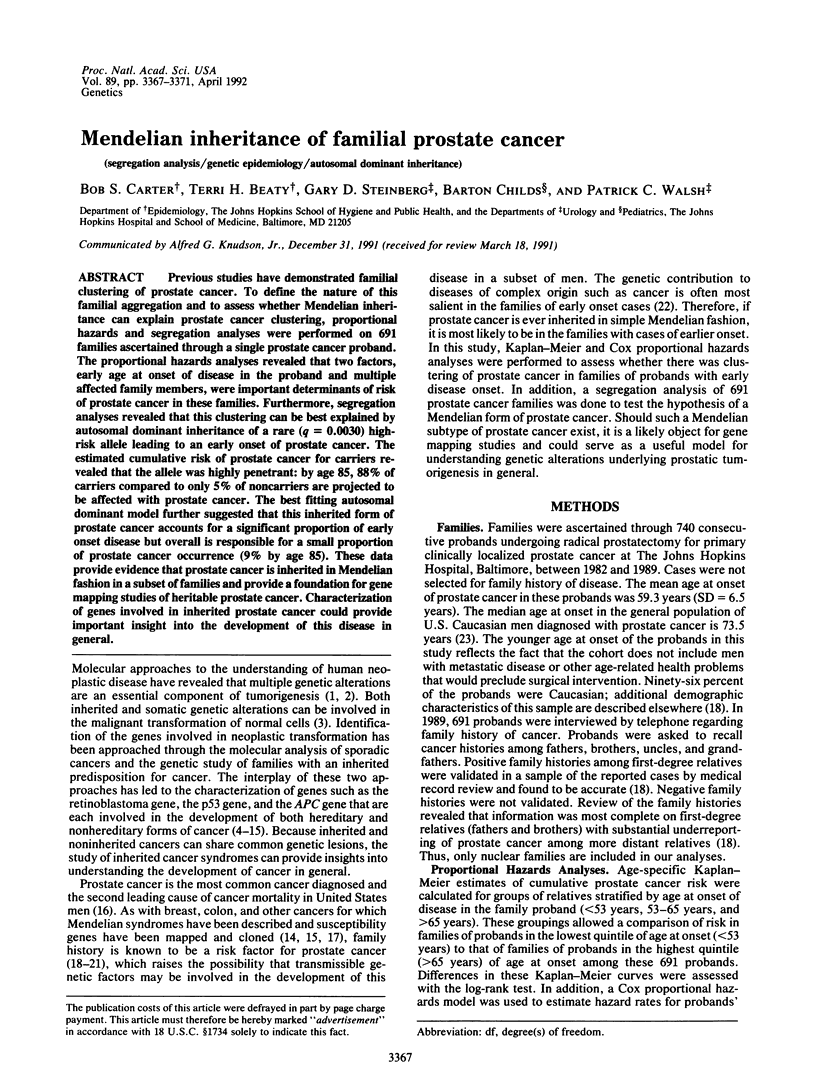
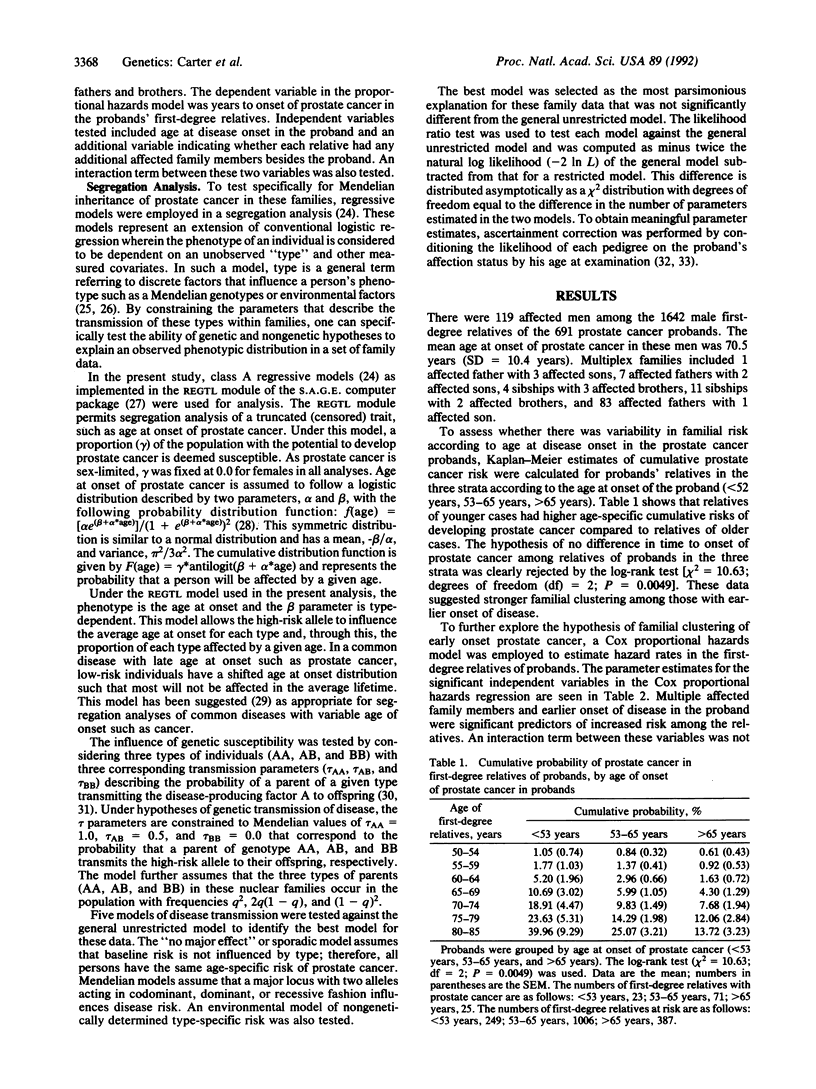
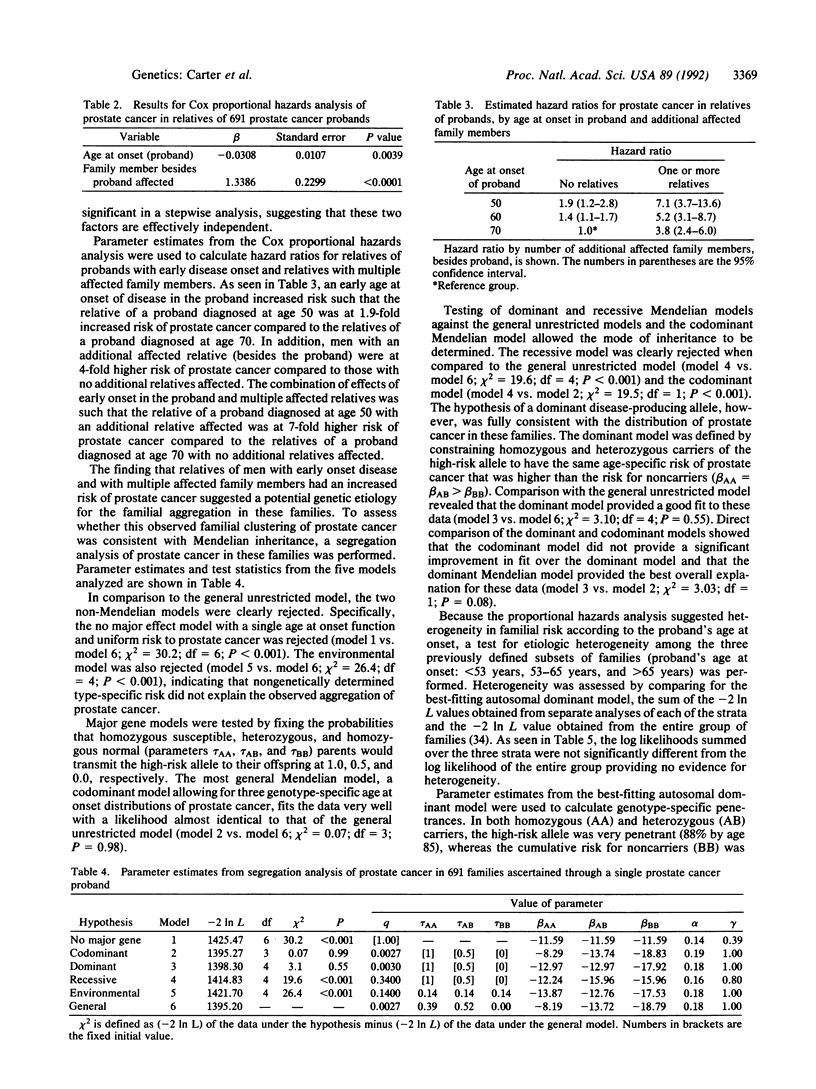
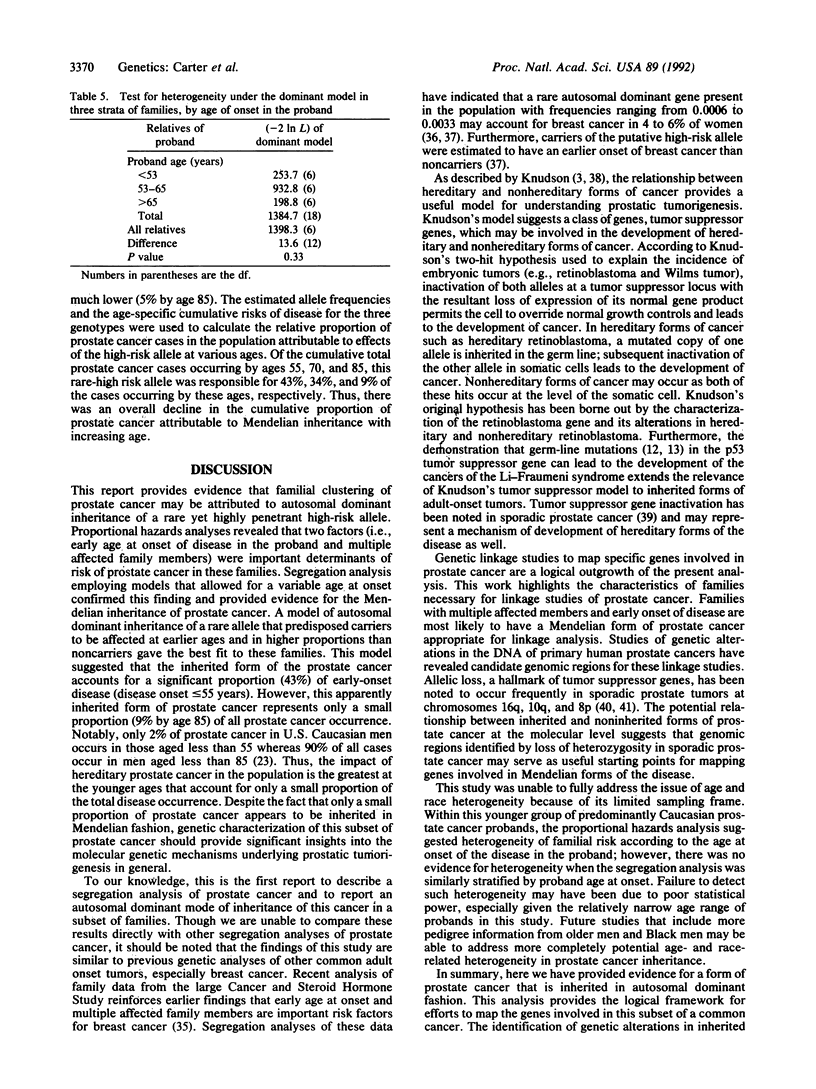
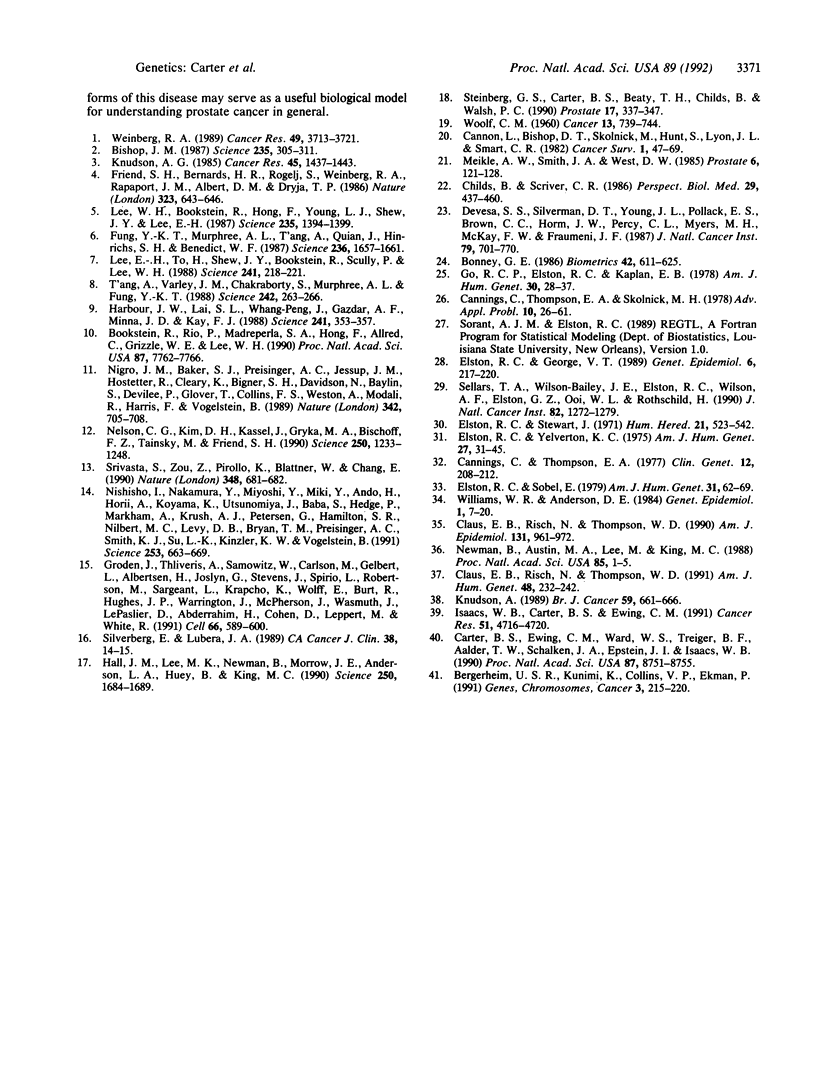
Selected References
These references are in PubMed. This may not be the complete list of references from this article.
- Bergerheim U. S., Kunimi K., Collins V. P., Ekman P. Deletion mapping of chromosomes 8, 10, and 16 in human prostatic carcinoma. Genes Chromosomes Cancer. 1991 May;3(3):215–220. doi: 10.1002/gcc.2870030308. [DOI] [PubMed] [Google Scholar]
- Bishop J. M. The molecular genetics of cancer. Science. 1987 Jan 16;235(4786):305–311. doi: 10.1126/science.3541204. [DOI] [PubMed] [Google Scholar]
- Bonney G. E. Regressive logistic models for familial disease and other binary traits. Biometrics. 1986 Sep;42(3):611–625. [PubMed] [Google Scholar]
- Bookstein R., Rio P., Madreperla S. A., Hong F., Allred C., Grizzle W. E., Lee W. H. Promoter deletion and loss of retinoblastoma gene expression in human prostate carcinoma. Proc Natl Acad Sci U S A. 1990 Oct;87(19):7762–7766. doi: 10.1073/pnas.87.19.7762. [DOI] [PMC free article] [PubMed] [Google Scholar]
- Cannings C., Thompson E. A. Ascertainment in the sequential sampling of pedigrees. Clin Genet. 1977 Oct;12(4):208–212. doi: 10.1111/j.1399-0004.1977.tb00928.x. [DOI] [PubMed] [Google Scholar]
- Carter B. S., Ewing C. M., Ward W. S., Treiger B. F., Aalders T. W., Schalken J. A., Epstein J. I., Isaacs W. B. Allelic loss of chromosomes 16q and 10q in human prostate cancer. Proc Natl Acad Sci U S A. 1990 Nov;87(22):8751–8755. doi: 10.1073/pnas.87.22.8751. [DOI] [PMC free article] [PubMed] [Google Scholar]
- Childs B., Scriver C. R. Age at onset and causes of disease. Perspect Biol Med. 1986 Spring;29(3 Pt 1):437–460. doi: 10.1353/pbm.1986.0056. [DOI] [PubMed] [Google Scholar]
- Claus E. B., Risch N. J., Thompson W. D. Age at onset as an indicator of familial risk of breast cancer. Am J Epidemiol. 1990 Jun;131(6):961–972. doi: 10.1093/oxfordjournals.aje.a115616. [DOI] [PubMed] [Google Scholar]
- Claus E. B., Risch N., Thompson W. D. Genetic analysis of breast cancer in the cancer and steroid hormone study. Am J Hum Genet. 1991 Feb;48(2):232–242. [PMC free article] [PubMed] [Google Scholar]
- Devesa S. S., Silverman D. T., Young J. L., Jr, Pollack E. S., Brown C. C., Horm J. W., Percy C. L., Myers M. H., McKay F. W., Fraumeni J. F., Jr Cancer incidence and mortality trends among whites in the United States, 1947-84. J Natl Cancer Inst. 1987 Oct;79(4):701–770. [PubMed] [Google Scholar]
- Elston R. C., George V. T. Age of onset, age at examination, and other covariates in the analysis of family data. Genet Epidemiol. 1989;6(1):217–220. doi: 10.1002/gepi.1370060138. [DOI] [PubMed] [Google Scholar]
- Elston R. C., Sobel E. Sampling considerations in the gathering and analysis of pedigree data. Am J Hum Genet. 1979 Jan;31(1):62–69. [PMC free article] [PubMed] [Google Scholar]
- Elston R. C., Stewart J. A general model for the genetic analysis of pedigree data. Hum Hered. 1971;21(6):523–542. doi: 10.1159/000152448. [DOI] [PubMed] [Google Scholar]
- Elston R. C., Yelverton K. C. General models for segregation analysis. Am J Hum Genet. 1975 Jan;27(1):31–45. [PMC free article] [PubMed] [Google Scholar]
- Friend S. H., Bernards R., Rogelj S., Weinberg R. A., Rapaport J. M., Albert D. M., Dryja T. P. A human DNA segment with properties of the gene that predisposes to retinoblastoma and osteosarcoma. Nature. 1986 Oct 16;323(6089):643–646. doi: 10.1038/323643a0. [DOI] [PubMed] [Google Scholar]
- Fung Y. K., Murphree A. L., T'Ang A., Qian J., Hinrichs S. H., Benedict W. F. Structural evidence for the authenticity of the human retinoblastoma gene. Science. 1987 Jun 26;236(4809):1657–1661. doi: 10.1126/science.2885916. [DOI] [PubMed] [Google Scholar]
- Go R. C., Elston R. C., Kaplan E. B. Efficiency and robustness of pedigree segregation analysis. Am J Hum Genet. 1978 Jan;30(1):28–37. [PMC free article] [PubMed] [Google Scholar]
- Groden J., Thliveris A., Samowitz W., Carlson M., Gelbert L., Albertsen H., Joslyn G., Stevens J., Spirio L., Robertson M. Identification and characterization of the familial adenomatous polyposis coli gene. Cell. 1991 Aug 9;66(3):589–600. doi: 10.1016/0092-8674(81)90021-0. [DOI] [PubMed] [Google Scholar]
- Hall J. M., Lee M. K., Newman B., Morrow J. E., Anderson L. A., Huey B., King M. C. Linkage of early-onset familial breast cancer to chromosome 17q21. Science. 1990 Dec 21;250(4988):1684–1689. doi: 10.1126/science.2270482. [DOI] [PubMed] [Google Scholar]
- Harbour J. W., Lai S. L., Whang-Peng J., Gazdar A. F., Minna J. D., Kaye F. J. Abnormalities in structure and expression of the human retinoblastoma gene in SCLC. Science. 1988 Jul 15;241(4863):353–357. doi: 10.1126/science.2838909. [DOI] [PMC free article] [PubMed] [Google Scholar]
- Isaacs W. B., Carter B. S., Ewing C. M. Wild-type p53 suppresses growth of human prostate cancer cells containing mutant p53 alleles. Cancer Res. 1991 Sep 1;51(17):4716–4720. [PubMed] [Google Scholar]
- Knudson A. G., Jr Hereditary cancer, oncogenes, and antioncogenes. Cancer Res. 1985 Apr;45(4):1437–1443. [PubMed] [Google Scholar]
- Knudson A. G., Jr The ninth Gordon Hamilton-Fairley memorial lecture. Hereditary cancers: clues to mechanisms of carcinogenesis. Br J Cancer. 1989 May;59(5):661–666. doi: 10.1038/bjc.1989.137. [DOI] [PMC free article] [PubMed] [Google Scholar]
- Lee E. Y., To H., Shew J. Y., Bookstein R., Scully P., Lee W. H. Inactivation of the retinoblastoma susceptibility gene in human breast cancers. Science. 1988 Jul 8;241(4862):218–221. doi: 10.1126/science.3388033. [DOI] [PubMed] [Google Scholar]
- Lee W. H., Bookstein R., Hong F., Young L. J., Shew J. Y., Lee E. Y. Human retinoblastoma susceptibility gene: cloning, identification, and sequence. Science. 1987 Mar 13;235(4794):1394–1399. doi: 10.1126/science.3823889. [DOI] [PubMed] [Google Scholar]
- Malkin D., Li F. P., Strong L. C., Fraumeni J. F., Jr, Nelson C. E., Kim D. H., Kassel J., Gryka M. A., Bischoff F. Z., Tainsky M. A. Germ line p53 mutations in a familial syndrome of breast cancer, sarcomas, and other neoplasms. Science. 1990 Nov 30;250(4985):1233–1238. doi: 10.1126/science.1978757. [DOI] [PubMed] [Google Scholar]
- Meikle A. W., Smith J. A., West D. W. Familial factors affecting prostatic cancer risk and plasma sex-steroid levels. Prostate. 1985;6(2):121–128. doi: 10.1002/pros.2990060202. [DOI] [PubMed] [Google Scholar]
- Nigro J. M., Baker S. J., Preisinger A. C., Jessup J. M., Hostetter R., Cleary K., Bigner S. H., Davidson N., Baylin S., Devilee P. Mutations in the p53 gene occur in diverse human tumour types. Nature. 1989 Dec 7;342(6250):705–708. doi: 10.1038/342705a0. [DOI] [PubMed] [Google Scholar]
- Nishisho I., Nakamura Y., Miyoshi Y., Miki Y., Ando H., Horii A., Koyama K., Utsunomiya J., Baba S., Hedge P. Mutations of chromosome 5q21 genes in FAP and colorectal cancer patients. Science. 1991 Aug 9;253(5020):665–669. doi: 10.1126/science.1651563. [DOI] [PubMed] [Google Scholar]
- Sellers T. A., Bailey-Wilson J. E., Elston R. C., Wilson A. F., Elston G. Z., Ooi W. L., Rothschild H. Evidence for mendelian inheritance in the pathogenesis of lung cancer. J Natl Cancer Inst. 1990 Aug 1;82(15):1272–1279. doi: 10.1093/jnci/82.15.1272. [DOI] [PubMed] [Google Scholar]
- Sheshberadaran H., Payne L. G. Protein antigen-monoclonal antibody contact sites investigated by limited proteolysis of monoclonal antibody-bound antigen: protein "footprinting". Proc Natl Acad Sci U S A. 1988 Jan;85(1):1–5. doi: 10.1073/pnas.85.1.1. [DOI] [PMC free article] [PubMed] [Google Scholar]
- Steinberg G. D., Carter B. S., Beaty T. H., Childs B., Walsh P. C. Family history and the risk of prostate cancer. Prostate. 1990;17(4):337–347. doi: 10.1002/pros.2990170409. [DOI] [PubMed] [Google Scholar]
- T'Ang A., Varley J. M., Chakraborty S., Murphree A. L., Fung Y. K. Structural rearrangement of the retinoblastoma gene in human breast carcinoma. Science. 1988 Oct 14;242(4876):263–266. doi: 10.1126/science.3175651. [DOI] [PubMed] [Google Scholar]
- Vogelstein B. Cancer. A deadly inheritance. Nature. 1990 Dec 20;348(6303):681–682. doi: 10.1038/348681a0. [DOI] [PubMed] [Google Scholar]
- WOOLF C. M. An investigation of the familial aspects of carcinoma of the prostate. Cancer. 1960 Jul-Aug;13:739–744. doi: 10.1002/1097-0142(196007/08)13:4<739::aid-cncr2820130414>3.0.co;2-e. [DOI] [PubMed] [Google Scholar]
- Weinberg R. A. Oncogenes, antioncogenes, and the molecular bases of multistep carcinogenesis. Cancer Res. 1989 Jul 15;49(14):3713–3721. [PubMed] [Google Scholar]
- Williams W. R., Anderson D. E. Genetic epidemiology of breast cancer: segregation analysis of 200 Danish pedigrees. Genet Epidemiol. 1984;1(1):7–20. doi: 10.1002/gepi.1370010104. [DOI] [PubMed] [Google Scholar]



